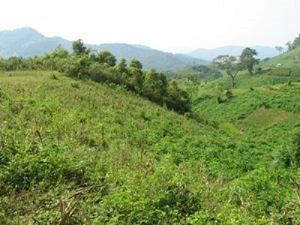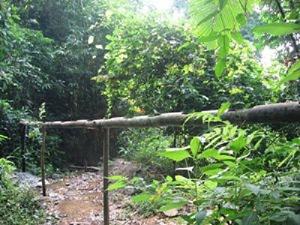Son Ho
The main objective of this study is to improve the understanding of the vulnerability of forest-human systems in the northern mountain region of Vietnam to the impacts of climate change.

Upland farms of H'Mong people in Ba Be National Park.
This project will be carried out in Ba Be National Park and Kim Hy Nature Reserves in Bac Kan province, northern mountainous region of Vietnam. These two protected areas are considered as highest biodiversity areas in northern regions as well as in Vietnam. However, like many other protected areas in Vietnam, these protected areas are facing multiple stresses which threaten both biodiversity conservation and local livelihoods .

Bamboo pipe for moving water from stream to irrigate farms or human use - a creative method for irrigation in mountainous region.
In Vietnam, about 25 million people live in or nearby to forests; most of them belong to minority ethnic groups. For many reasons, people in mountain regions of Vietnam are vulnerable to multiple stresses, including climate change. In terms of climate change impacts, mountain regions in Vietnam are - along with coastal areas – the most vulnerable to climate change. Most climate adaptation projects in Vietnam focus on coastal areas. However, 80% of people living in or nearby forests, including protected areas, are poor or very poor; their livelihoods derive largely from forests. Increased vulnerability for these people will inevitably impact adversely on forests and the services they provide.
Therefore, the question of how these human-environment systems are vulnerable is , fundamental to understanding how to reduce their vulnerabilities and increase resilience. The answers to these questions will help to develop a framework for policy and management responses which enable local communities to improve their livelihoods and manage natural resources, including biodiversity, sustainably under conditions resulting from climate change.
Little attention has been paid so far to the consequence of climate change for coupled social ecological systems, especially forest-human systems. Understanding climate change impacts in these terms is clearly fundamental to addressing the adverse impacts it may have on the forest-human systems of Vietnam’s northern mountain region. This research is intended to provide an important part of the foundations for the responses that will be necessary to sustain people and forests in Vietnam’s northern mountain region. The region is an important repository of ecosystem services, including biodiversity. However, mountain regions are being impacted by significant pressures, including population growth and unsustainable resource use; these in turn are impacting on environmental services. These pressures are likely to be exacerbated by climate change, for example through increased frequency of extreme events. This project will examine how local people are vulnerable to different stressors, and how conservation strategies can address their vulnerability.